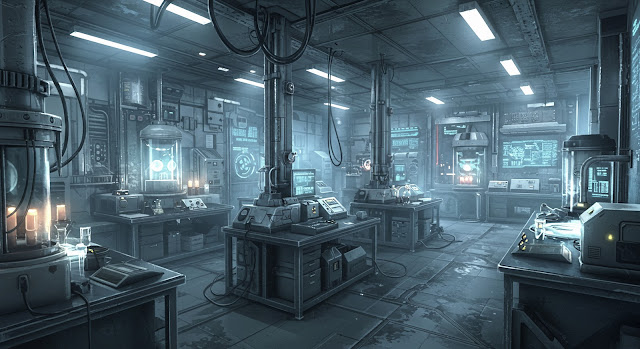| Generated by Google Flow text-to-video AI software, powered by Veo 3.1 |
Renata has grown bored as they wait for the next assault. She and her mother
successfully forced the first group of attackers off the road, and then
another one once they reached the log cabin, but there hasn’t been a peep
since. They’re still here, having already buried the bodies in shallow
graves. The worry is not that someone else will come, but that they won’t.
They are the decoy team, while Quidel and Lycander are the ones in charge of
the real package. There is a procedure for meeting back up later, but that’s
following 24 hours of no activity at the safehouse. It involves switching
cars, and traveling to a small town farther east.
“Hey,” she says, holding her cup of tea. “Are you the strong, silent type,
or can you talk?”
“I can talk,” the driver replies. “I just don’t usually say much.”
“That’s basically the definition of the strong silent type. Can I sit?”
“Be my guest.”
She sits down on the swing, still wrapped in her quilt. It’s funny, sitting
here with a stranger, but she’s sick of being inside, and there is no other
seating on the porch. She takes a sip. “What about your name? Is it a
secret? Does my mother just call you The Driver?”
He chuckles. “It’s Polykarpos. Polykarpos Goldd. Everyone just calls me
Polly.”
“It’s nice to meet you, Polly. I’m Renata, by the way. I don’t know if I
ever said that.”
“Madam Granger speaks of you often.”
“She does?”
“Yes. She’s quite proud of you.”
“Did she tell you to say that?”
“I work for her, but I have my own opinions. She tells me what to do, not
how to think.”
She nods, and doesn’t speak for a moment as they just enjoy the sunrise.
“How long have you worked for the NSD?”
“I technically don’t. I work for a company that contracts to the NSD.
Many low-level jobs like mine are like that.”
“I wouldn’t call it low-level. That was some smooth driving while we were
being shot at. You didn’t flinch at the bullets. You must have
some tactical training.”
Polly smiles. “Well, I wasn’t always only a driver.”
That’s when Libera interrupts. “Ren, could you help me with something? We
need some more firewood from the shed.”
“I can do that, sir,” Polly says as he’s standing up.
“No, I want my daughter,” Libera discourages.
Renata knows this tone well. Libera doesn’t actually need help with
anything, but wants to speak privately. She downs the rest of her tea, which
has already gotten cold out here in the winter woods, and sets it
precariously on the window sill. A metaphor for her and her mother’s
relationship?
They head out into the shed, and Libera just stands there, not even
pretending that the request was genuine. “You don’t need to be talking to
him too much.”
“I’m a big girl, and I actually think he’s younger than me.”
“That’s not the point,” Libera contends. “He’s...irrelevant.”
“What the hell is that supposed to mean, that he’s expendable?”
“Look, some people in this world are simply more important than others. You
could call them...exemplars. I’m an exemplar, you’re an exemplar. Polly is
just...background. I have no plans for him.”
“Plans? What about Lycander, is he background too? I saw the way you looked
at him, like you couldn’t trust him. Do you too have bad history?”
Libera smirks. “Lycander is something else.”
“And Quidel?”
“He’s very something else.”
Renata shakes her head, and consults her watch. “Let’s go find that small
town where we’re supposed to meet up.”
“It hasn’t been twenty-four hours yet,” Libera says.
“We have to wait that long to make the call,” Renata reasons, “but we may as
well get there. I would rather wait by a real bathroom.” She begins to
leave.
“We have a nice bathroom here.”
“Get the car!” Renata shouts up to Polly as she’s walking back to the cabin.
“I wanna get some real breakfast, instead of these MREs.”
“Yes, sir.” Polly hops down the steps, and heads towards the back, where
they hid the car loosely under some brush.
Renata, meanwhile, picks her teacup up to prepare to wash it.
Libera starts walking up the steps as she’s watching Polly walk away. “He
followed your orders.”
“What?”
“You told him to do something, and he didn’t hesitate. He didn’t even look
over at me for guidance. He just went off to do it.”
“Yeah, we bonded a little. He trusts me. I’m sure I was nicer to him in
those two minutes than you ever have been, if you think he’s only
background,” Renata says with airquotes.
Libera scowls at her daughter. “Go make your bed. We should leave this place
looking like we’re trying to make it look like no one has been here
for months.”
“Yes, sir! Commander, sir!” Renata replies sarcastically. She goes back into
the cabin even though her bed is already made because she’s no longer a
child. While she’s finishing the dishes, she hears the sound of gunfire. She
drops the cup into the sink, letting it shatter. She grabs the pistol from
the counter, and heads outside.
It’s another group of attackers, hoping to get their hands on their special
device, not knowing that it isn’t really here. She sees three men a few
meters from the cabin, pointing their shotguns at Polly. He’s sitting in the
dirt, holding the right side of his chest with one hand, and trying to drag
himself away from the shooters with his other.
“One more step, and he dies!” one of the bad guys says in a Javelotian
accent. Javelot is one of their closest allies. “Gun on the ground!”
Renata drops her gun.
“Wait!” Libera is walking through the door behind Renata, her hands up in
supposed surrender. In one hand, she’s holding the decoy bag. “You came for
this, you can have it!”
“Drop it down the steps,” the Javelotian guy demands.
“Does that sound wise and safe?” Libera asks rhetorically. She sets it down
on the porch, and begins to back away from it, as does Renata in the
opposite direction.
Two of the Javelotians creep up to it, pointing their weapons at the ladies,
but of course, it doesn’t matter. The bomb in the bag explodes them both
when one of them tries to open it, and the surprise is enough to push the
remaining Javelotian off balance. Libera pulls her own pistol out of the
back of her pants, and shoots him dead. It was a short-lived attack, but
they’re not out of the woods yet.




